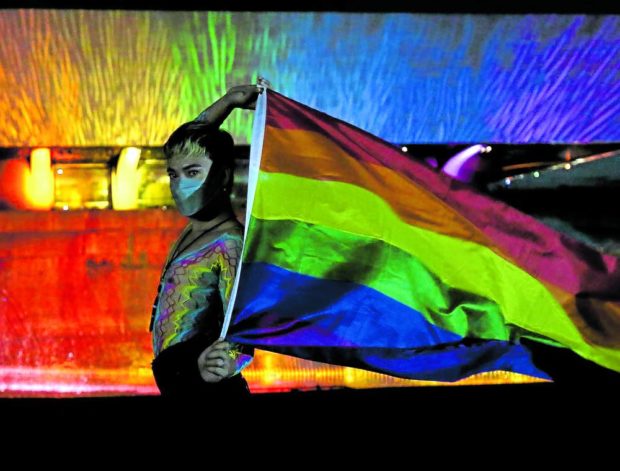Today’s job seekers aren’t just after the money

PRIDE COLORS The facade of Cultural Center of the Philippines in Pasay City lit up in LGBTQ+ flag colors on June 25 to celebrate Pride month. —RICHARD A. REYES
Having to endure discrimination in school for most of her life made Loreta Arroyo want to take control of her future. And her job seeking led to a company that embraces diversity, inclusivity, and more importantly, respects her identity.
Job seekers today, especially those from a different race and background—LGBT, working mothers, persons with disabilities, etc.—are looking for more than just salary offers.
According to a survey conducted by JobStreet, a leading employment platform in Southeast Asia, more than 50 percent of Filipino job seekers will refuse to work for employers that do not align with their beliefs, including in terms of diversity and inclusion.
“[Inclusivity culture] was a huge factor [in looking for a job] because as a member of the LGBT community, I have heard stories where a certain workplace would enact gender-insensitive rules,” Arroyo says.
“As a person who identifies as a trans woman, my main consideration was actually the inclusivity in the workplace. It matters to me because, in my head, working in an inclusive environment would give me the peace of mind that I would work comfortably, free from any form of discrimination whatsoever,” she adds.
Some companies, Arroyo laments, have discriminatory rules that force LGBT members “to wear uniforms based on their assigned sex at birth.” And if a company had discriminatory rules, it was a red flag when she was seeking employment. “I’d rather spend time looking for other companies,” she says.
She found a suitable workplace at Edukasyon.ph, an education technology platform, where majority of her coworkers are women or LGBT members.
Imperative for all
For an organization to embody inclusivity in the workplace, everyone—from executives to junior team members—must have a deeper understanding and commitment toward the brand values, culture and display authenticity and acceptance.
JobStreet Philippines country manager Philip Gioca emphasizes that an inclusive culture and behavior toward other employees starts from the top. Employees of an organization will follow the standards set by company executives in treating their diverse workforce.
More than just making decisions for the company, corporate policies and behaviors, after all, are carried out from the top-level management. They set the standards for how each employee co-exists with one another.
According to JobStreet’s research, having diverse talent in the workplace leads to higher levels of productivity and performance as well as improved employee retention rates.
At Edukasyon.ph, Arroyo considers herself lucky and proud to work in an organization that is gender-inclusive and sensitive.
To create a genuinely inclusive atmosphere in the workplace, companies should maintain an open line for communication especially amid the hybrid and remote work setup as this can help avoid language barriers and miscommunication, according to Jobstreet.
Gioca encourages utilizing a standard operating procedure, such as using emails to communicate important announcements and updates, having meetings virtually and a team group chat for quick-task related messages.
JobStreet also recommends having regular alignment meetings to assure that teams are on the same page and to fast-track decision-making within a diverse organization. This is seen to help maintain, even enhance, inclusive company culture in addition to having catch-ups, regular virtual activities and town hall meetings with the employees.
To address diversity, Edukasyon.ph has in their handbook rules on sexual orientation, gender identity, gender expression and sex characteristics or SOGIESC, specifically to implement inclusivity and diversity without any difficulty, Arroyo says.
“Respecting everyone’s SOGIESC is at the core of our day-to-day interactions and it’s safe to say it’s been working well in terms of that,” she notes.
For Arroyo, if office uniforms are required, for instance, it’s best that they are gender neutral or to give people the option to choose which one fits their gender identities better.
Customization
JobStreet’s Gioca suggests creating programs anchored on employee needs and workplace flexibility to attain inclusivity, as adopting programs based on the needs of their employees helps showcase the company’s sincerity in achieving inclusivity. Companies can also introduce peer mentors to support new hires to adapt to the organization.
While the pandemic has introduced new work arrangements such as hybrid working and flexible work arrangements, allowing employees to stay in the office to accomplish their tasks at their own pace and time can help produce the best results possible.
Moreover, ensuring those who work from home have the same benefits and opportunities as those working in the office generates a more inclusive workplace.
Among Edukasyon.ph’s projects to educate others on inclusivity is “Yaring Pinay,” a partnership with the Australian government’s initiative “Investing in Women.” Yaring Pinay focuses on making the various technical-vocational education and training institutions gender inclusive and diverse.
Arroyo also notes that acceptance may depend on the generation employees come from. Older millennials to baby boomers may need more gender sensitivity trainings and seminars on SOGIESC, while younger employees such as Gen Zs may need less as they are more proactive in showing support not only to the LGBT community but to working mothers, persons with disabilities as well as people from another race.
“These are small things that companies can do to be more inclusive without negatively affecting their profits—on the contrary, it can even boost employees’ productivity and morale, seeing that they are all respected and recognized,” Arroyo says.
As diversity is embedded into the hiring process of companies, the management should now adapt and take this into consideration when implementing inclusivity rules in a diverse workforce.
“Inclusivity means it’s not just allowing people to be tolerated but it’s important that people are valued and appreciated because many things can happen in diverse teams. You won’t believe what they can do, and they can reach impossible things together,” Gioca says.
